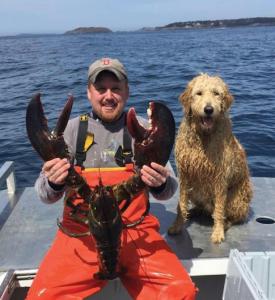Dustin Delano

Young Fishermen in the Northeast United States
Interviews with 39 fishers between the ages of 18-35, located along the US East Coast from Maine to North Carolina. Collectively, they represent a wide variety of gear types and fisheries. All had been fishing full-time for at least two years and wanted to make fishing their career. They describe motivations for choosing a fishing career, strategies used, barriers encountered, and facilitating factors that have enabled interviewees to defy the graying trend to become successful fishermen.
Please visit the Voices SoundCloud page to explore clips and stories that relate to this collection.
Sarah Schumann
Dustin Delano, 28 years old at the time of the interview, is owner-operator of the F/V Knotty Lady, a lobster boat out of Friendship, Maine. Dustin started fishing at age 11, the fourth generation in his family to follow this line of work. After taking a meandering path through higher education, he wound up back in his hometown doing what he loves: lobstering. He is one of several captains to capitalize on ecological changes by developing a menhaden seine fishery in Midcoast Maine.
Scope and Content Note
In his interview, Dustin talks about his role as a member of the Maine Lobstermen's Association, the value of Maine's student lobster license program in preventing a graying industry, and the role of lobstering in community identity. Dustin also shares concerns about offshore wind development and right whale protection measures, which may threaten his livelihood and the sustainability of the fishery. He emphasizes the importance of protecting the fishery and encourages young people to consider fishing as a viable career path despite societal pressure to pursue higher education. He discusses the financial aspects of lobstering, mentioning the rising costs of bait, fuel, and equipment. He notes the importance of work ethic, being aware of the industry's developments, and staying involved through organizations like the Maine Lobstermen's Association can help navigate the uncertainties of the fishing profession. Dustin also talks about how his faith in Christianity has played a role in his fishing career.
“When I was in high school," Dustin says. "there was this cliché that if you didn’t go to college, basically, you’re not going to amount to anything. I don’t agree with that philosophy. I don’t think everybody’s made to go to college. I don’t think they need to. Not everybody’s going to need a master’s degree in engineering. I feel like we’ve gotten ahead of ourselves too much… I think fishing’s what makes us who we are. What we have, lobstering, growing up here, working on boats, working those fifteen-hour days, going in the nasty weather, seeing what it was like ten years ago when things weren’t quite as profitable—that’s all made us who we are now. It’s through those experiences that we can build on and use them as we try to navigate through to the future.”
Please Note: The oral histories in this collection are protected by copyright and have been created for educational, research and personal use as described by the Fair Use Doctrine in the U.S. Copyright law. Please reach out Voices@noaa.gov to let us know how these interviews are being used in your research, project, exhibit, etc. The Voices staff can help provide other useful resources related to your inquiry.
The NOAA mission is to understand and predict changes in climate, weather, oceans, and coasts, to share that knowledge and information with others, and to conserve and manage coastal and marine ecosystems and resources. The Voices Oral History Archives offers public access to a wide range of accounts, including historical materials that are products of their particular times, and may contain offensive language or negative stereotypes.
Voices Oral History Archives does not verify the accuracy of materials submitted to us. The opinions expressed in the interviews are those of the interviewee only. The interviews here have been made available to the public only after the interviewer has confirmed that they have obtained consent.
